Chile VegOils Imports: The US Plays Hard with LATAM Teams
Talk to our team about AgFlow's offering →
Reading time: 2 minutes
In the dynamic world of global trade, the Chilean vegetable oils industry plays a pivotal role as a significant consumer and importer of these essential commodities. As we delve into the trade and import dynamics of Chile’s vegetable oils market from January to August 2023, we will explore the key factors shaping this industry and the challenges it faces.
Chile’s Growing Appetite for Vegetable Oils
Chile’s vibrant culinary culture and rising health-conscious consumer trends have led to an increased demand for vegetable oils. This demand is met through a combination of domestic production and imports. However, most vegetable oils consumed in Chile are imported from various countries.
As per AgFlow data, Chile imported 21,000 tons of VegOil in Jan – Aug 2023. In that period, key suppliers were Argentina (16,500 tons) and Uruguay (4,500 tons). In 2021, Chile imported Soybean Oil worth $196 million, becoming the 18th largest importer of Soybean Oil in the world. At the same year, Soybean Oil was the 91st most imported product in Chile. Chile imports Soybean Oil primarily from: Argentina ($182 million), Bolivia ($11.5 million), the United States ($2.02 million), Paraguay ($240k), and Peru ($124k). In 2018, the rapeseed oil consumption in Chile amounted to 220 thousand metric tons, up from 200 thousand metric tons consumed a year earlier.

Key Factors Influencing Trade
- Consumption Trends: The demand for vegetable oils in Chile is driven by evolving dietary preferences. Health-conscious consumers have shifted towards healthier options, such as olive and sunflower, resulting in a surge in their imports.
- Economic Factors: The economic stability of Chile, combined with favorable exchange rates, makes it an attractive market for vegetable oil exporters. The country’s economic strength ensures a consistent demand for these essential commodities.
- Production Capacity: Despite increased domestic production, Chile still relies heavily on imports to meet its vegetable oil demand. Local production of key oils like soybean and canola oil has grown steadily, but it is insufficient to meet the nation’s needs.
- Global Market Dynamics: The global vegetable oil market is highly competitive and prone to price fluctuations. Events like droughts, trade disputes, and changes in government policies in major exporting countries can significantly impact the availability and prices of vegetable oils in Chile.
Trade-offs in Balancing Factors
Chile’s vegetable oil industry faces a delicate balancing act. On one hand, the nation aims to promote domestic production to reduce its reliance on imports. This aligns with the goals of ensuring food security and economic stability. On the other hand, consumer preferences for specific imported oils challenge this strategy.
Challenges and Approaches
- Sustainability: Ensuring sustainable sourcing of vegetable oils is a challenge. Chile is actively exploring sustainable farming practices to address environmental concerns and maintain a balance between economic growth and conservation.
- Quality Control: Maintaining consistent quality in imported vegetable oils is crucial. Strict quality control measures are essential to meet consumer expectations and regulatory standards.
- Market Volatility: The volatile nature of global commodity markets can lead to price fluctuations. Diversifying sources of imports and having robust risk management strategies are essential to mitigate these risks.
Conclusion
Chile’s vegetable oils trade and imports in 2023 reflect a complex interplay of factors, including changing consumer preferences, economic stability, and global market dynamics. As Chile continues to balance its domestic production and imports, it faces both opportunities and challenges in ensuring a stable supply of vegetable oils to meet the diverse needs of its consumers.
This analysis provides insights for professionals in the agricultural commodity industry and anyone interested in understanding the intricate dynamics of a nation’s vegetable oils trade. The future of Chile’s vegetable oils industry depends on its ability to adapt to evolving trends and challenges while striving for sustainability and quality.
Try AgFlow Free
Access Free On Updates for Corn, Wheat, Soybean,
Barley, and Sunflower Oil.
No Credit Card Required & Unlimited Access In Time

